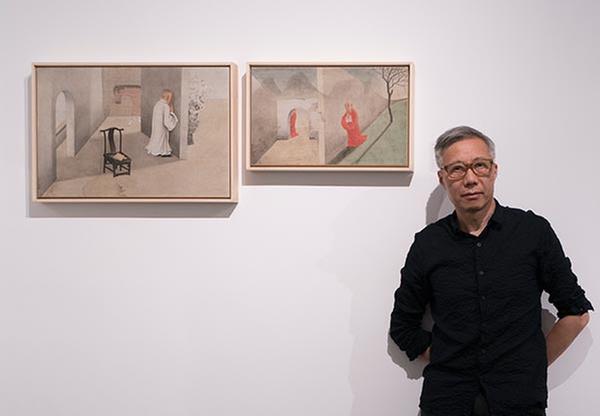Looking at himself from the outside leads artist to paint Chinese monks
By Zhang Kun | China Daily | Updated: 2017-09-05 08:00
 |
| Yu Qiping is staging a solo show in Shanghai, featuring mostly portraits of monks. [Photo provided to China Daily] |
Yu Qiping attributed his meticulous approach to art to his Virgo sign of the zodiac and B blood type.
The artist's paintings depicting monks in traditional Chinese courtyards and secluded places are now on show at the Anyi Gallery of Shanghai through Sept 12.
Yu paints in the traditional fine-brush style of China, using ink, mineral pigments and rice paper.
Each stroke, however fine a line, has to be accurate, while the foggy watery atmosphere on the paper is achieved through the repeated application of different shades of a particular color.
"It is time-consuming and exhausting, especially for the eyes," says the 60-year-old artist.
However, being "a B-type and a Virgo", he says, he is strict with his work. Such personality may not necessarily bring out satisfactory art, but "painting or manual work suits me", he adds.
In his paintings, the monks lean by a wall, read in front of a desk or sit by a river. In some pictures a second figure of the same look is present, sneaking a peek or oblivious to the presence of others on the other side of the wall.
"All of these characters are projections of me," says the artist while he's standing in front of a painting of a bare-footed monk leading a horse by a leash, walking through a bamboo plantation.
Yu was born in Nanjing, Jiangsu province, and spent a few years as a child with his parents in the countryside.
As a boy, he found a book about how to draw a horse and learned from it.
"I used to draw little animals on the wall and won praise from people passing by," he recalls.
This encouraged him and he went on to draw through his school years. In 1980, he enrolled at the Chinese painting department of Nanjing Art Academy.
After graduation he worked as an art editor at Jiangsu Pictorial, a local magazine. It was in the 1980s when China's art scene was going through major changes.
The magazine played an active role to promote China's first generation of contemporary artists, such as Gu Wenda, Zhang Xiaogang and Xu Bing.
- Beyond tech: Int'l forum sheds light on future art, music and film
- Powerful traditions of stone sculpting live on
- 106 countries and regions join the 4th Silk Road International Art Festival
- Art Expo Beijing gathers different types of art
- Folk artists showcase skills, stunts during competition in Shandong
























